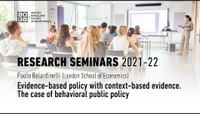Research Seminar | Evidence-based policy with context-based evidence. The case of behavioral public policy
Paolo Belardinelli (London School of Economics). Chair: Anthony Bertelli (IBEI)
Available in video:
Evidence-based policy encompasses two core sequential elements: (i) the production of credible evidence about “what works”, by means of rigorous research methods and (ii) the use of such evidence to implement interventions shown to be effective, in the form of public policy. By taking the example of evidence produced in behavioral science and how this can shape public policy, most famously through the implementation of nudging techniques, this article analyzes two main challenges of evidence-based policy, one related to evidence production, and the other related to the use of evidence in public policy. As for evidence production, two distinct theoretical approaches are compared, namely the bounded rationality perspective and the ecological rationality perspective, to show how the same factual observations might be interpreted differently depending on the theoretical lenses adopted. Concerning the use of evidence, cultural theory is used to argue that this is necessarily affected by the context where the decision is made.
Paolo Belardinelli received his PhD in Public Policy and Administration from Bocconi University, Milan. His research focuses on behavioural public policy and administration and the title of his doctoral thesis is “Systematic Deviations from Rational Decision-Making in Public Administration.” Methodologically, most of his ongoing work makes use of experiments, though he is also interested in quasi-experimental designs and mixed methods.
|
*This activity has limited capacity. Registration is required to have a guaranteed seat and be able to attend the face-to-face modality. Virtual attendees will receive the access link by email.
|


